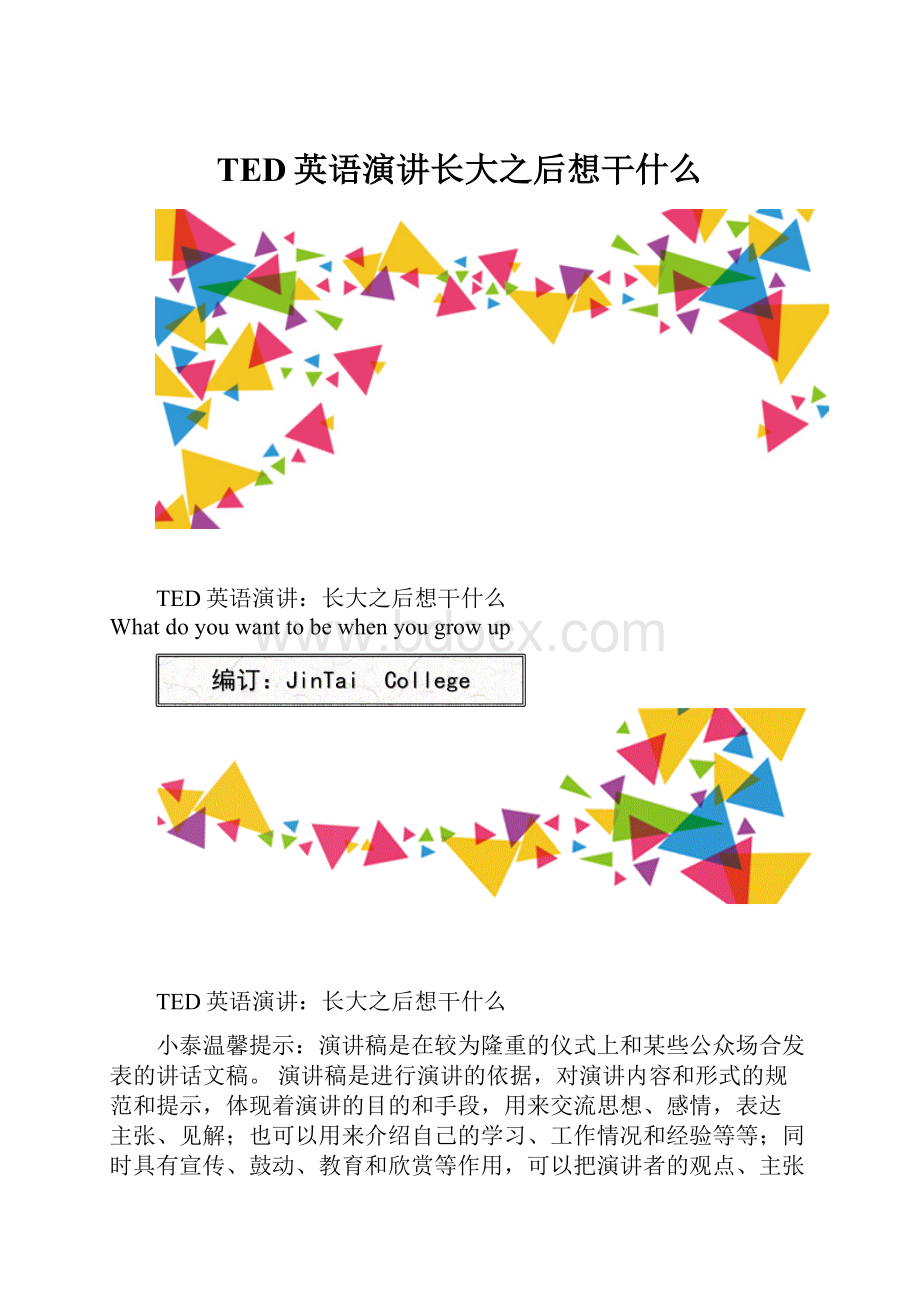TED英语演讲长大之后想干什么.docx
《TED英语演讲长大之后想干什么.docx》由会员分享,可在线阅读,更多相关《TED英语演讲长大之后想干什么.docx(10页珍藏版)》请在冰豆网上搜索。

TED英语演讲长大之后想干什么
TED英语演讲:
长大之后想干什么
Whatdoyouwanttobewhenyougrowup
TED英语演讲:
长大之后想干什么
小泰温馨提示:
演讲稿是在较为隆重的仪式上和某些公众场合发表的讲话文稿。
演讲稿是进行演讲的依据,对演讲内容和形式的规范和提示,体现着演讲的目的和手段,用来交流思想、感情,表达主张、见解;也可以用来介绍自己的学习、工作情况和经验等等;同时具有宣传、鼓动、教育和欣赏等作用,可以把演讲者的观点、主张与思想感情传达给听众以及读者,使他们信服并在思想感情上产生共鸣。
本文档根据演讲稿内容要求展开说明,具有实践指导意义,便于学习和使用,本文下载后内容可随意修改调整及打印。
我们一定都被问过“长大后你想成什么样的人?
”,这个问题伴随着我们的成长。
它从最初童言无忌的回答到后来让我们彻夜难眠。
这个问题背后折射出了一种什么样的文化和社会现象呢?
它对我们有很积极的作用吗?
它适合于所有的人来回答吗?
下面是小泰为大家收集关于TED英语演讲:
长大之后想干什么,欢迎借鉴参考。
演讲者:
EmilieWapnick
演讲稿
Iwanttostartbydoinganexperiment.I'mgoingtoplaythreevideosofarainyday.ButI'vereplacedtheaudioofoneofthevideos,andinsteadofthesoundofrain,I'veaddedthesoundofbaconfrying.SoIwantyouthinkcarefullywhichonetheclipwiththebaconis.
我想用一个实验来开始我的演讲。
我将给你们播放三段雨天的视频。
不过我把其中一个视频里的音频换成了别的,它不再是下雨的声音,变成了煎培根的声音。
我想让你们认真听,找出哪个视频里是煎培根声。
Raiseyourhandifyou'veeverbeenaskedthequestion"Whatdoyouwanttobewhenyougrowup?
"
如果你们曾被问过这个问题,请举手“你长大之后想干什么?
”
Nowifyouhadtoguess,howoldwouldyousayyouwerewhenyouwerefirstaskedthisquestion?
Youcanjustholdupfingers.Three.Five.Three.Five.Five.OK.Now,raiseyourhandifthequestion"Whatdoyouwanttobewhenyougrowup?
"hasevercausedyouanyanxiety.
现在大家回想一下,你们第一次被问这个问题是多大?
你们可以举手指头来示意一下。
三岁,五岁,三岁,五岁,五岁,好的。
接下来,如果刚刚说的这个问题,“你长大之后想干什么?
”曾经让你感到焦虑,请举手。
Anyanxietyatall.
I'msomeonewho'sneverbeenabletoanswerthequestion"Whatdoyouwanttobewhenyougrowup?
"
我永远无法回答这个问题,“你长大之后想干什么?
”
See,theproblemwasn'tthatIdidn'thaveanyinterests--it'sthatIhadtoomany.Inhighschool,IlikedEnglishandmathandartandIbuiltwebsitesandIplayedguitarinapunkbandcalledFrustratedTelephoneOperator.Maybeyou'veheardofus.
并不是说我没有兴趣爱好,而是我的兴趣爱好太多。
高中的时候,我喜欢英语、数学和艺术,建过网站在一个叫“失意电话话务员”的朋克乐队当吉他手。
也许你们还听说过我们乐队呢。
Thiscontinuedafterhighschool,andatacertainpoint,IbegantonoticethispatterninmyselfwhereIwouldbecomeinterestedinanareaandIwoulddivein,becomeall-consumed,andI'dgettobeprettygoodatwhateveritwas,andthenIwouldhitthispointwhereI'dstarttogetbored.AndusuallyIwouldtryandpersistanyway,becauseIhadalreadydevotedsomuchtimeandenergyandsometimesmoneyintothisfield.Buteventuallythissenseofboredom,thisfeelingof,like,yeah,Igotthis,thisisn'tchallenginganymore--itwouldgettobetoomuch.AndIwouldhavetoletitgo.
高中毕业后我也依旧兴趣广泛,某一天,我发现自己有一个行为模式,我会对某一个领域感兴趣,然后一头扎进去,认真钻研,变得越来越擅长,但到了某一个阶段,我就会开始觉得无聊。
通常我会继续坚持下去,因为我已经投入了很多时间和精力,有时候还有金钱。
但是最终这种无聊的感觉,就像在说,哦,这事我已经会了,已经没有任何挑战了,再继续也不会有多大成就了。
我必须要放手。
ButthenIwouldbecomeinterestedinsomethingelse,somethingtotallyunrelated,andIwoulddiveintothat,andbecomeall-consumed,andI'dbelike,"Yes!
Ifoundmything,"andthenIwouldhitthispointagainwhereI'dstarttogetbored.Andeventually,Iwouldletitgo.ButthenIwoulddiscoversomethingnewandtotallydifferent,andIwoulddiveintothat.
但之后我可能又会对另一些事感兴趣,跟之前完全不同的领域,我又会一头扎进去,认真钻研,然后说,“太棒了!
这就是我的菜!
”之后我又会达到那个阶段,开始觉得无聊。
最后,我又会放弃。
之后我又会发现新的兴趣,不同的领域然后一头扎进去。
Thispatterncausedmealotofanxiety,fortworeasons.ThefirstwasthatIwasn'tsurehowIwasgoingtoturnanyofthisintoacareer.IthoughtthatIwouldeventuallyhavetopickonething,denyallofmyotherpassions,andjustresignmyselftobeingbored.Theotherreasonitcausedmesomuchanxietywasalittlebitmorepersonal.Iworriedthattherewassomethingwrongwiththis,andsomethingwrongwithmeforbeingunabletostickwithanything.IworriedthatIwasafraidofcommitment,orthatIwasscattered,orthatIwasself-sabotaging,afraidofmyownsuccess.
这种模式让我非常焦虑,原因有两点。
一是我不确定如何才能将这些兴趣变成我的职业。
我觉得自己最终会从(这些兴趣)里面挑一个,而对其他爱好忍痛割爱,做好将来一定会无聊的心理准备。
让我非常焦虑的第二个原因,跟我自身有关。
我担心自己的这种行为模式是错的,自己这么朝三暮四,是不是错了。
我是不是害怕做出承诺,或者自由散漫,破罐子破摔,惧怕成功。
Ifyoucanrelatetomystoryandtothesefeelings,I'dlikeyoutoaskyourselfaquestionthatIwishIhadaskedmyselfbackthen.Askyourselfwhereyoulearnedtoassignthemeaningofwrongorabnormaltodoingmanythings.I'lltellyouwhereyoulearnedit:
youlearneditfromtheculture.
如果你能理解我的故事和我的感受,请你们问自己一个问题,这个问题我早就该问自己的。
就是,你是从哪里学到该如何判断我们的所作所为是错误的或者不正常的。
我来告诉你答案:
是从我们的文化中学到的。
Wearefirstaskedthequestion"Whatdoyouwanttobewhenyougrowup?
"whenwe'reaboutfiveyearsold.Andthetruthisthatnoonereallycareswhatyousaywhenyou'rethatage.
我们第一次被问到“你长大之后想干什么?
”是在差不多五岁的时候。
其实像你那么大的时候没有人会真的关心你说了什么。
It'sconsideredaninnocuousquestion,posedtolittlekidstoelicitcutereplies,like,"Iwanttobeanastronaut,"or"Iwanttobeaballerina,"or"Iwanttobeapirate."InsertHalloweencostumehere.
这仅仅是一个无伤大雅的问题,为的是让小朋友做出可爱的回应,比如,“我想当宇航员”,或者“我想当芭蕾舞演员”,或者“我想当海盗”。
此处应加万圣节服装的特效。
Butthisquestiongetsaskedofusagainandagainaswegetolderinvariousforms--forinstance,highschoolstudentsmightgetaskedwhatmajorthey'regoingtopickincollege.Andatsomepoint,"Whatdoyouwanttobewhenyougrowup?
"goesfrombeingthecuteexerciseitoncewastothethingthatkeepsusupatnight.Why?
然而这个问题,在我们成长的过程中会不断被问到形式多种多样,比如,高中生会被问到,你们在大学准备选什么专业。
突然有一天,“你长大之后想干什么?
”从原本一种秀可爱的方式变成了让我们寝食难安的难题。
为什么会这样?
See,whilethisquestioninspireskidstodreamaboutwhattheycouldbe,itdoesnotinspirethemtodreamaboutallthattheycouldbe.Infact,itdoesjusttheopposite,becausewhensomeoneasksyouwhatyouwanttobe,youcan'treplywith20differentthings,thoughwell-meaningadultswilllikelychuckleandbelike,"Oh,howcute,butyoucan'tbeaviolinmakerandapsychologist.Youhavetochoose."
尽管这个问题鼓励小朋友想象自己将来要做什么,但它并未给小朋友充分想象的自由。
恰恰相反,它限制了小朋友想象的自由,因为有人问你长大后想做什么,你不可能回答20种不同的职业,尽管有些善良的大人会笑呵呵地说,“哦,你太可爱了,但是你不能同时成为小提琴制作家和心理学家啊。
你必须选一个。
”
ThisisDr.BobChilds--andhe'saluthierandpsychotherapist.AndthisisAmyNg,amagazineeditorturnedillustrator,entrepreneur,teacherandcreativedirector.Butmostkidsdon'thearaboutpeoplelikethis.Alltheyhearisthatthey'regoingtohavetochoose.Butit'smorethanthat.Thenotionofthenarrowlyfocusedlifeishighlyromanticizedinourculture.It'sthisideaofdestinyortheonetruecalling,theideathatweeachhaveonegreatthingwearemeanttododuringourtimeonthisearth,andyouneedtofigureoutwhatthatthingisanddevoteyourlifetoit.
这位是鲍勃·柴尔兹博士,他是一名弦乐器工匠和心理医生。
这位是艾米·恩,之前是杂志编辑,后来成为插画作家,企业家教师和创意总监。
但大部分孩子都没听说过他们。
他们听到的只是要他们进行选择和取舍。
事情远不止这么简单。
一生都心无旁骛的这一观念,在我们的文化中被过分浪漫化了。
这种命运论或者说“命中注定的职业”的概念,意思是我们每个人都有一份命中注定的伟大事业,我们需要找到它,并为之奋斗一生。
Butwhatifyou'resomeonewhoisn'twiredthisway?
Whatiftherearealotofdifferentsubjectsthatyou'recuriousabout,andmanydifferentthingsyouwanttodo?
Well,thereisnoroomforsomeonelikeyouinthisframework.Andsoyoumightfeelalone.Youmightfeellikeyoudon'thaveapurpose.Andyoumightfeellikethere'ssomethingwrongwithyou.There'snothingwrongwithyou.Whatyouareisamultipotentialite.
但如果你不是这样的人呢?
如果你对很多事都有好奇心,想去尝试各种各样的职业呢?
那么在现有体系中,你很难有容身之处。
你也许会感到孤独。
你也许会觉得自己没有目标。
你也许会觉得自己是不是有问题。
你没有问题。
你是一名“多重潜力者”。
Amultipotentialiteissomeonewithmanyinterestsandcreativepursuits.It'samouthfultosay.Itmighthelpifyoubreakitupintothreeparts:
multi,potential,andite.Youcanalsouseoneoftheothertermsthatconnotethesameidea,suchaspolymath,theRenaissanceperson.Actually,duringtheRenaissanceperiod,itwasconsideredtheidealtobewell-versedinmultipledisciplines.BarbaraSherreferstousas"scanners."Usewhichevertermyoulike,orinventyourown.IhavetosayIfinditsortoffittingthatasacommunity,wecannotagreeonasingleidentity.
“多重潜力者”拥有多种兴趣并且追求创新。
听起来很费解吧。
如果把它拆成三部分可能比较好理解:
多重的,有潜力的,人。
你也可以用其他词来表述类似的意思,比如“博学者”,或者“文艺复兴者”。
实际上,在文艺复兴时代,精通多个学科是非常被推崇的。
芭芭拉·谢尔称我们为“扫描仪”。
你可以选择一个自己喜欢的词,或者创造一个新的。
我感觉自己找到了组织,因为我们无法接受只有一种身份。
It'seasytoseeyourmultipotentialityasalimitationoranafflictionthatyouneedtoovercome.ButwhatI'velearnedthroughspeakingwithpeopleandwritingabouttheseideasonmywebsite,isthattherearesometremendousstrengthstobeingthisway.Herearethreemultipotentialitesuperpowers.
人们很容易把多重潜力视为一种局限或者痛苦,需要克服。
但我通过与人们交流,以及把这些观点发到我的网站上,我发现多重潜力者有很多优点。
多重潜力者拥有三种“超能力”。
One:
ideasynthesis.Thatis,combiningtwoormorefieldsandcreatingsomethingnewattheintersection.ShaHwangandRachelBinxdrewfromtheirsharedinterestsincartography,datavisualization,travel,mathematicsanddesign,whentheyfoundedMeshu.Meshuisacompanythatcreatescustomgeographically-inspiredjewelry.ShaandRachelcameupwiththisuniqueideanotdespite,butbecauseoftheireclecticmixofskillsandexperiences.Innovationhappensattheintersections.That'swherethenewideascomefrom.Andmultipotentialites,withalloftheirbackgrounds,areabletoaccessalotofthesepointsofintersection.
第一是产生创意。
就是说,结合两个或两个以上领域从结合处寻求创新。
黄沙和瑞秋·宾克斯找到了共同的兴趣爱好,像制图,数据可视化,旅行,数学和设计,之后他们创办了Meshu。
Meshu是一家定制珠宝公司,专门制作具有地域特色的珠宝。
黄沙和瑞秋之所以能产生这个独特的创意,正是因为他俩博学多才,经历丰富。
创新来源于交叉处。
新创意(大都)来源于此。
而多重潜力者,拥有丰富的(知识)背景,能够在各领域交叉处找到突破点。
Thesecondmultipotentialitesuperpowerisrapidlearning.Whenmultipotentialitesbecomeinterestedinsomething,wegohard.Weobserveeverythingwecangetourhandson.We'realsousedtobeingbeginners,becausewe'vebeenbeginnerssomanytimesinthepast,andthismeansthatwe'relessafraidoftryingnewthingsandsteppingoutofourcomfortzones.What'smore,manyskillsaretransferableacrossdisciplines,andwebringeverythingwe'velearnedtoeverynewareawepursue,sowe'rerarelystartingfromscratch.
多重潜力者的第二种超能力是快速学习。
当多重潜力者对某件事产生兴趣时,我们会全身心投入。
我们仔细观察,勤于实践。
我们已经习惯于当初学者,因为我们过去曾当过无数次初学者,我们不怕尝试新事物,勇于走出舒适区。
除此以外,很多能力在各个学科都是通用的,我们将之前所学用于新领域,而不用从零开始。
NoraDunnisafull-timetravelerandfreelancewriter.Asachildco